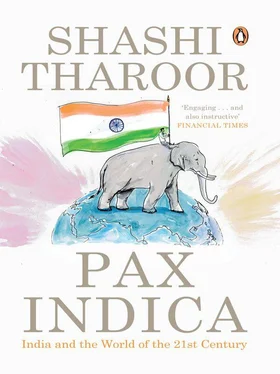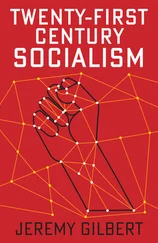India has the ability and the vision to promote global partnerships across the broad range of its interests; it only needs to act. In a 2012 speech, National Security Adviser Shivshankar Menon stated that ‘As a nation state India has consistently shown tactical caution and strategic initiative, sometimes simultaneously. But equally, initiative and risk taking must be strategic, not tactical, if we are to avoid the fate of becoming a rentier state.’ He provided an instructive example of what this would mean in practice:
It means, for instance, that faced with piracy from Somalia, which threatens sea-lanes vital to our energy security, we would seek to build an international coalition to deal with the problem at its roots, working with others and dividing labour. Today the African Union has peacekeeping troops on the ground in Somalia. We could work with others to blockade the coast while the AU troops act against pirate sanctuaries on land, and the world through the Security Council would cut their financial lifelines, build the legal framework to punish pirates and their sponsors and develop Somalia to the point where piracy would not be the preferred career choice of young Somali males.
This is an intriguing idea, one which so far remains in the realm of ideas rather than of implementable policy. But it is an encouraging indication that responsible Indians are already thinking beyond the established prisms of conventional policy-making to a broader and more effective Indian internationalism in the twenty-first century.
While global institutions are adapting to the new world, regional ones could emerge. The world economic crisis should give us an opportunity to promote economic integration with our neighbours in the subcontinent who look to the growing Indian market to sell their goods and maintain their own growth. But as long as South Asia remains divided by futile rivalries, and some continue to believe that terrorism can be a useful instrument of their strategic doctrines, that is bound to remain a distant prospect. We in South Asia need to look to the future, to an interrelated future on our subcontinent, where geography becomes an instrument of opportunity in a mutual growth story, where history binds rather than divides, where trade and cross-border links flourish and bring prosperity to all our peoples. Some will say these are merely dreams; but dreams can turn into reality if all of us — India and its neighbours — take action to accomplish this brighter future together.
At the same time there is a consensus in our country that India should seek to continue to contribute to international security and prosperity, to a well-ordered, peaceful and equitable world, and to democratic, sustainable development for all. These objectives now need to be pursued while taking into account twenty-first-century realities: the end of the Cold War, the dawning of the information era, the ease of worldwide travel and widespread migration, the blurring of national boundaries by movements, networks and forces transcending state frontiers, the advent of Islamist terrorism as a pan-global force, the irresistible rise of China as an incipient superpower while retaining its political authoritarianism, the global consciousness of ‘soft power’, and the end to the prospect of military conflict between any two of the major nation states. All these elements — discussed in the course of the preceding chapters — must be considered in formulating the grand strategy for India in the twenty-first century.
India too has changed. Its economic growth and entrepreneurial dynamism, both allowed to flourish only in the last couple of decades, have created a different India, which therefore relates to the world differently. ‘Material well-being is supreme,’ wrote Kautilya in the fourth-century BCE Arthasastra . Twenty-five centuries later, we may have returned to his timeless wisdom. India’s economic growth has significantly added credibility to the country’s international profile. After decades of being portrayed as a poor and backward nation, India’s transformation into a global force on the back of its economic triumphs and its technological prowess is a new fact of life. There has been a profound reassessment across the globe of India’s international importance and future potential. New Delhi’s success in handling its internal problems, including secessionist movements, has also confirmed the perception of India as a serious power, in Malone’s words ‘the cohesive anchor of its subcontinent and wider region’.
India’s generous aid programmes, its extensive international peacekeeping commitments, the personal stature of its prime minister (described in a leading international poll as the world’s most respected governmental leader) and its indispensable role in the making of G20 policy, all testify to a nation that has, in President Obama’s words, ‘emerged’ and is making a significant impact on international affairs. The path to taking on more ambitious responsibilities on the global stage lies ahead. Instinctive approaches formulated at a time when India was a major recipient of foreign aid, and saw itself as a developing country needing to assert itself in the face of the hegemony of the former imperial powers, are no longer entirely relevant when India gives as much aid as its receives, makes more foreign direct investments than it gets and is seen by other countries as a source of assistance, guidance and even security. The time has come for India to move beyond issues of status and entitlement to a diplomacy of pragmatism and performance in helping guide a world that it is now unchallengeably qualified, together with others, to lead.
At the same time, it is important not to be carried away by hubris. Shiv Shankar Menon put it well in a recent speech:
We must always be conscious of the difference between weight, influence and power. Power is the ability to create and sustain outcomes. Weight we have, our influence is growing, but our power remains to grow and should first be used for our domestic transformation. History is replete with examples of rising powers who prematurely thought that their time had come, who mistook influence and weight for real power. Their rise, as that of Wilhelmine Germany or militarist Japan, was cut short prematurely.
Real power may not yet be India’s, but its weight is incontestable and its international influence is already being exercised in creative new ways. One example of India’s constructively deployed influence that is worth examining in detail is India’s aid policy.
India’s aid programmes in its neighbourhood and in Africa have been characterized by a willingness to let the recipient set the terms, respect for the priorities and the culture of the recipients, and a focus on projects that promote self-reliance, economic growth and political democracy (including women’s empowerment). Though some 75 per cent of India’s aid is tied to the provision of goods and services from Indian suppliers — an excusable condition for aid coming from a developing country — it has by and large been welcomed as helpful, less intrusive and less disruptive than other countries’ (the traditional donors’) aid programmes have tended to be. As such it now forms an essential part of India’s projection to the world.
This too echoes ancient Indian wisdom. A millennium and a half ago, the great king Harsha declared: ‘Before, while amassing all this wealth, I lived in constant fear of never finding a storeroom solid enough to keep it in. But now that I have spread it in alms upon the field of happiness I regard it as forever preserved!’ The 2011 Africa-India summit in Addis Ababa, Ethiopia, at which the Indian government pledged $5 billion in aid to African countries, drew attention to a largely overlooked phenomenon — India’s emergence as a source, rather than a recipient, of foreign aid. For decades after independence — when Britain left the subcontinent one of the poorest and most ravaged regions on earth, with an effective growth rate of 0 per cent over the preceding two centuries — India was seen as an impoverished land of destitute people, desperately in need of international handouts. Many developed countries showcased their aid to India; Norway, for example, established in 1959 its first-ever aid programme there. But, with the liberalization of the Indian economy in 1991, the country embarked upon a period of dizzying growth, averaging nearly 8 per cent a year since then. During this time, India weaned itself from dependence on aid, preferring to borrow from multilateral lenders and, increasingly, from commercial banks.
Читать дальше












